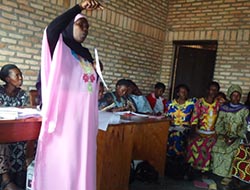|
COCOF is a Rwandese organization created in 1994 by a group of rural women from the district of Kamonyi, with the aim to promote the socio, economic and political development of women. To date COCOF has 482 women members and 5881 beneficiaries with 68% women and 32% men. Beneficiaries are grouped in cooperatives. COCOF intervenes in 6 programs with a predominance on agriculture sector with a strategy to work around 2 soyabean value chains: certified seed production under contract with RAB (Rwanda Agriculture Board) and bulking grain for COCOF processing unit called MFPI (Muhanga Food Processing Industries). In these 2 value chains, COCOF provides inputs (seed and fertilizers) on credit to beneficiaries and gets refund at harvest at the time of collecting the production to sell to RAB and/or MFPI. |

|
COCOF is a Rwandese organization created in 1994 by a group of rural women from the district of Kamonyi, with the aim to promote the socio, economic and political development of women. To date COCOF has 482 women members and 5881 beneficiaries with 68% women and 32% men. Beneficiaries are grouped in cooperatives.
COCOF intervenes in 6 programs with a predominance on agriculture sector with a strategy to work around 2 soyabean value chains: certified seed production under contract with RAB (Rwanda Agriculture Board) and bulking grain for COCOF processing unit called MFPI (Muhanga Food Processing Industries). In these 2 value chains, COCOF provides inputs (seed and fertilizers) on credit to beneficiaries and gets refund at harvest at the time of collecting the production to sell to RAB and/or MFPI.
Each year, COCOF collects 60-100 ton of soyabean grain for MFPI and 10-15 tons of soyabean seeds, 120-150 tons of maize seeds, to RAB.
With the intervention of N2Africa and the use of BNF technologies, COCOF beneficiaries affirm to have increased the yield of soyabean to 2-2.5 ton per ha. With the income generated from the sales of soyabean and maize, they have invested in other non-agriculture projects to improve the welfare of their families.
This is a summary by Speciose Kantengwa of an article in French by Nzigiye Cyrille, Agronome, responsible for N2Africa within COCOF. To read the full French article click here.
